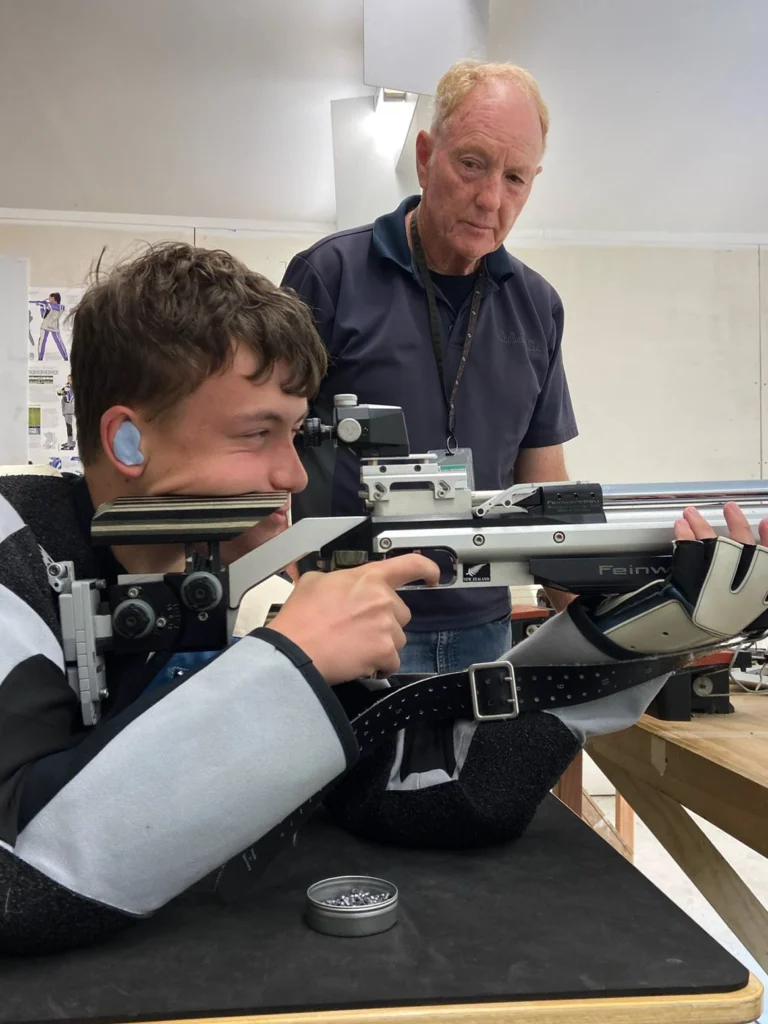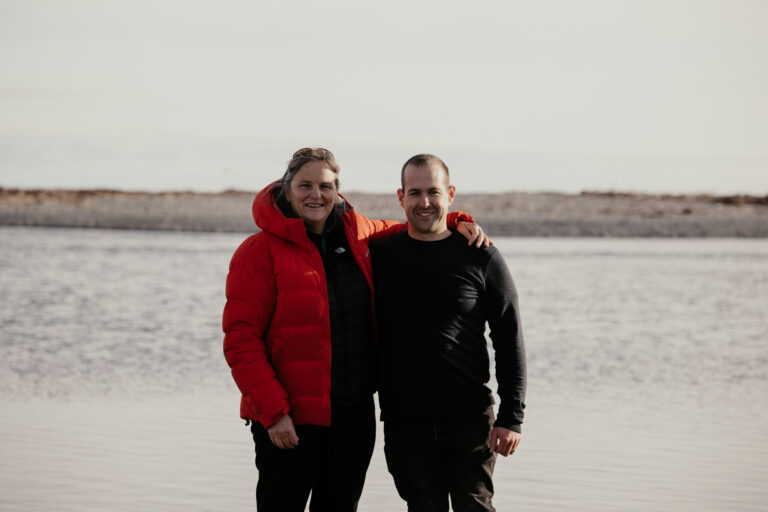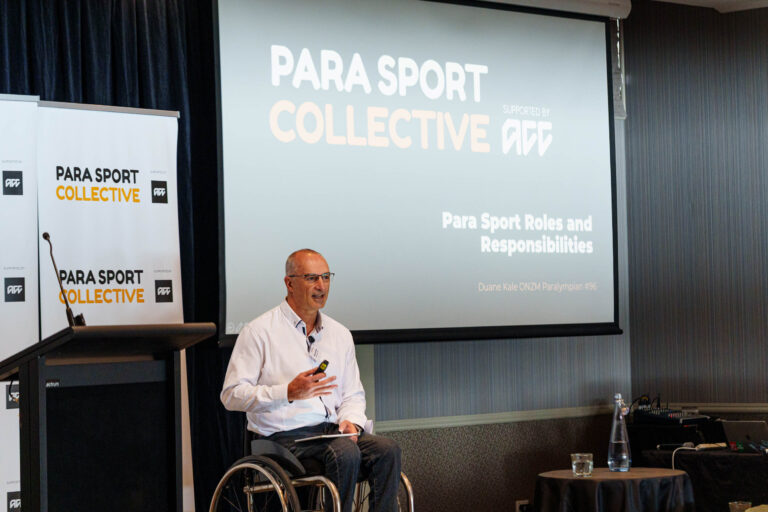Septuagenarian coach Dave Sheely has played a pivotal role in coaching Shooting Para sport in New Zealand over the past decade-and-a-half. A member of intake-two of the Para Sport Collective, supported by ACC, the Waikato-based coach shares his journey and his insights from his time in the sport.
Dave Sheely is quite simply Mr Shooting.
A five times national champion in the 50m Running Target rifle event and a World Championship representative he later pivoted to coaching – guiding athletes to gold medals at the Commonwealth Games.
Yet more latterly Dave is best known for his work with Shooting Para sport athletes, steering Paralympian #193 Jason Eales to the Rio 2016 Paralympic Games and currently coaching emerging teenage talent Andrew Fairweather.

Perhaps it was always Dave’s destiny to coach Shooting Para sport. Back in the 1980s the now retired mechanic fitted hand controls to cars for the disabled meanwhile in 1990 his sister, Cathy, became a wheelchair user after sustaining serious injuries when struck by a car while training on her bike for a triathlon.
“I was contacted by Parafed Waikato in 2011 and asked if I would like to coach Para athletes,” he explains. “Given my background, it was a very easy question for me to answer.”
Born and raised in his early years in Tauranga, Dave was first introduced to shooting through his father who was a keen hunter.
First embracing the competitive side of the sport as an 18-year-old, the rifle specialist was pleasantly surprised to finish fourth on his debut appearance at the New Zealand Championships, placing fourth in the 50m running target event at the 1973 edition in Dunedin.
“I shouldn’t have really done that well competing with the equipment that I had,” explains Dave. “I was using an ex-Army .303 gun, which was not really a target rifle at all. I remember scoring 84 out of 100 which was not bad at all with that gear.”
Attracted to the “challenge” of competing in the sport, shooter Jim Milligan was impressed by Dave’s potential. Encouraging Dave to shoot at the range on his farm – close to Whakatāne – the youngster, who had now purchased a much better rifle, drove down from his home at that time in Rotorua every weekend to practice and he quickly progressed.
In 1976 he claimed the first of five national titles in the 50m Running Target and later that year finished 32nd in that event at the World Shooting Championships in Munich.
Carving out a proud career on the shooting range he decided to embark on a new path in the late 1980s. By this time the 50m event had changed to the 10m Running Target, shot with air rifles. Struggling to adapt to the demands of the new discipline, Dave opted to move into coaching.
“I was at the point in my life when I wanted to impart my knowledge and share with younger people my training ideas and tactics,” says Dave, who is based in Ngāruawāhia in Waikato. “The funny thing was, I never had a coach throughout my career but I often wonder if I did, how much better I could have been.”
With the introduction of the 10m Running Target event for at the 1990 Commonwealth Games in Auckland he successfully coached Tony Clarke and Paul Carmine to the pairs title and Clarke to bronze in the individual 10m Running Target.
Honing his coaching skills through a series of coaching seminars and by leaning on the expertise of some of the country’s leading clubs, he continued to mature as a coach.
Strong in the technical elements to the sport, he also acknowledged the important role psychology plays in enabling an athlete to fulfill their potential.
“Visualisation is such a powerful tool,” he explains. “Shooting is such a results orientated sport and it is very easy to become too outcome focused. What is more important is the process you need to put in place to achieve that result. Sometimes the process itself could fill a couple of pages. If I had to reflect on myself, I believe I am stronger at the psychological skills, even more so than the technical skills.”
After receiving that call from Parafed Waikato, his coaching career included Para athletes for the first time and he was fortunate to coach a strong crop based out of Hamilton Pistol Club, led by Paralympian Jason Eales, Cameron Frew and Phillip Skinner.
“Up until 2013 these guys were training once a week but it soon became obvious that Phillip and Jason were quite exceptional and they started started training twice a week and by 2015 it was three to four times a week,” adds Dave.
The hard work started to pay dividends and Jason and Phillip were rewarded when teaming up with Paralympian #148 Michael Johnson MNZM as the trio claimed team gold in the R5 Mixed 10m Air Rifle Prone SH2 at the 2015 World Cup in Sydney. Jason also added more gloss on his performance in Australia by capturing an individual bronze in the R5 Mixed 10m Air Rifle Prone SH2.

Dave later guided Jason to the Rio 2016 Paralympic Games, where he placed 17th in the R5 Mixed 10 m Air Rifle Prone SH2. Proud of his accomplishments and the exceptional achievements of his Para athletes, he stepped away from coaching for a period following a heart attack and other medical challenges, but has more recently re-engaged in his passion for Shooting Para sport coaching and currently guides Hamilton-based teenage talent Andrew Fairweather.
His coaching career also received an unexpected boost after he was successfully nominated by Michael Johnson to join the second intake of the Para Sport Collective offering a great opportunity for Dave to further develop his coaching skills.
“I learned so much and what really struck home was the quality of all the presenters,” he explains. “There was a common thread throughout all the presentations in that from a coaching point of view you need to work with the Para athlete as a person first, rather than just an athlete.
“Sport is just a part of their life, not their whole life. If you understand that, it will allow you to get much more out of the athletes that you coach.”
Now aged 71, Dave is showing no signs of slowing down and admits he would like to take on a more “substantial” coaching role in the future.
So, what differences has he gleaned about coaching Shooting Para sport athletes compared to non-disabled shooters?
“Things do happen a lot slower, so it is important to be patient and don’t rush,” he explains. “Yet when working with Para athletes what is also important is to allow them to drive the programme. I have not lived life as a disabled person, so I can’t presume for one minute to know what they are going through. The coach-athlete relationship should be led by the Para athlete first.”




























